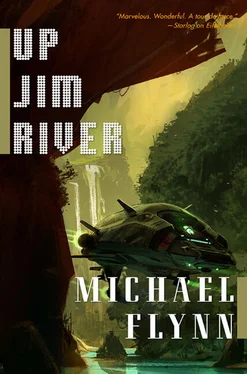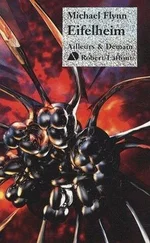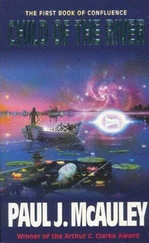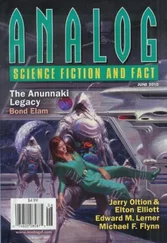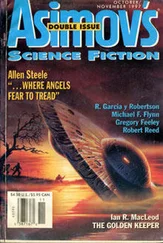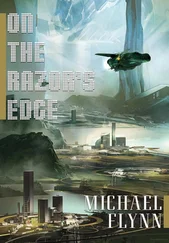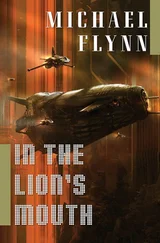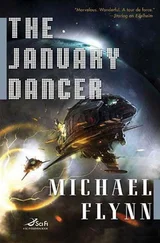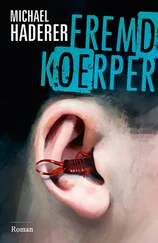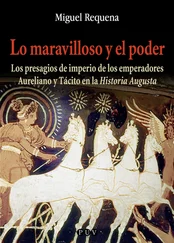“What was that?” asked Méarana, who had emerged from her room, eyes raw and face red and puffy. She held the harp against her chest like a shield.
Donovan tossed the crumpled message and it arced gracefully into the flash hole, where it flared into ash. “An offer to buy a double-gross of your medallions.”
The harper cocked her head and plucked a few random notes. She said, “A generous offer?”
Donovan nodded. “Very.”
“Then, I suppose, we had better find some.”
Donovan sighed, and closed his eyes, and…
… and the table is dark wood, longer than it is wide, and no less well-wrought for being imaginary. The room it centers is vague and shades off into shadows in which flare dim lamps that cast no pools of illumination and whose muted reflections glimmer in the table’s polished surface. Ten padded, high-backed chairs ring the table and before each lies a pad of smart paper and a light-pen .
Seven of the seats are occupied, each by a version of himself .
Donovan looks around the circle. “Whose idea was this?”
Pedant’s, says the Sleuth. The Sleuth is a whippet of a man, so lean that he seems taller than his companions. Sharp eyes flank a thin, hawk-like nose and confer an aspect of alertness, as his prominent, squarish chin bestows determination .
“I’ve always wondered what you looked like,” says Donovan .
Irony becomes you, the Sleuth responds . Would you like me to describe your self?
“What need? We are identical septuplets, are we not? Only the seemings differ.”
Then, the seeming is what matters. Recall that a man shares all but a fraction of his genes with the chimpanzee. But this does not show how alike are man and chimp, but how little genes matter in things that matter.
Donovan thinks he would have recognized Pedant even without his ponderous pronouncements. His body appears somehow corpulent; his face massive, like a man who has lately enjoyed a very large dinner. His gray, watery eyes give him a dreamy, introspective countenance. He rumbles with laughter . Aristotle compared the act of knowing to the act of eating. In either case, you take something in, and you make it a part of yourself.
It is the sort of irritating “factlet” that Pedant emits like particles from a lump of radium—allieviated only by his periodic sulks, as if he withdrew into a private club where the members never speak to one another .
Donovan’s inner eye flickers from one persona to another. “So, what’s the agenda, and why the elaborate visualization?” He looks to the Fudir, who usually has control of the visual cortex, but the scrambler sits at the far end of the table, his expression masked by distance .
“Will you take the bribe?” the Fudir asks .
“Two hundred kilobills?” Donovan laughs. “Why not?”
To his right, farther down the table, the Brute rumbles. That version of Donovan seems as large as the Pedant, but harder, more solid, yet at the same time lithe and athletic. The hardness extends even to the eyes. We shouldn’t run out on her, he says. Can we be bought for so little?
“It’s not that little. It’s enough to keep Fudir drunk for as long as he likes.”
The Fudir shakes his head. “You’re the one who needs to numb the fear with spirits.”
“Or is it,” says Donovan, “to numb the spirits.”
“A nice play. But, which spirits?”
“The spirits of the past who haunt your present.”
“Bastard.”
“And it’s less that we abandon her, Brute, but that she abandons her.”
Méarana will never abandon her mother. Beside the Brute sits a veiled figure who speaks with a silky and seductive voice .
“Do you think so? She’s on the edge of retribution even now. The smallest push…”
Retribution? For what?
“How often has Bridget ban abandoned the harper? Why not return the favor just this once?”
Is morality transitive, then? Does her abandonment justify ours?
Bridget ban was sent on assignments, says the Sleuth . That’s not abandonment.
“A touching faith in logic, Sleuth. But it’s not what something is that matters, it’s what that something seems. I never said she intended to abandon the quest. I said she felt entitled to do so.”
The Fudir speaks from the far end of the table. “How would you know how she feels, Donovan? You’d need feelings of your own to recognize them in others.”
Donovan cocks his head. “Perhaps you ought to ask Pedant to purge those memories. The ghosts seem to bother you.”
“Not his memories to purge. What of your ghosts? You’re the one Those tortured. I slept through the whole thing. Small wonder you run in fear.”
A smaller version of Donovan, one with large, wide eyes and prominent ears, slips from his chair and scampers about the perimeter of the room. From the ill-defined darkness come the sound of door latches jiggling, of bolts shutting home. «The courier hasn’t caught up yet; but we should bar the doors.»
“Those aren’t real doors, Child,” Donovan chides him .
«And Zorba… Zorba will hunt us down if we abandon her!»
“If we bring her back safe, Zorba has no complaint coming.”
“And what of Bridget ban,” says the Fudir, “and her discovery? Does Zorba not want those as well?”
“His threat covered only the harper,” Donovan answers. “If he wanted a broader contract, he should have laid out the terms more clearly. Let it go, Fudir. Bridget ban is gone. Zorba knew that. Eventually, even Méarana will know it. And whatever she discovered—or thought she had discovered—is best left lost. Weapons that save the world have the power to wreck it.”
Don’t be so sure.
“Sure of what, Sleuth? That she’s dead? Or that dreadful weapons should be left alone?”
That the courier has been left behind.
“Ahh. Don’t let that message spook you. You’re reading too much between the lines.”
That’s what intelligence means. Inter legere, in the old, dead Romavasi tongue. “To read between.”
Surely, a man smart enough to send messages to every ship is intelligent enough to learn on which ship it found its mark.
“You don’t expect they’ll really pay up, do you?” says Fudir. “Two hundred thousand Bills, just to go home and drink? We used to do that for free. The likelier payment is knives between our ribs, not bills between our fingers.”
«If Those of Name know that Bridget ban was tracking down some sort of weapon against them, why would They give up the quest even if we do, even if Méarana does, even if Bridget ban failed?»
“What matter? We’d be out of it—back on Jehovah, the harper back on Dangchao. Off the bull’s-eye.”
No. If Bridget ban found the weapon before They killed her, They would already have it. But if They killed her before she found it—or if the finding of it killed her—They don’t yet know where it is, either.
Donovan says, “That the finding is what killed her is not the best argument you could have mustered for pressing the search.”
Think it through, Donovan. If the harper is the best handle for tracking Bridget ban, and hence for finding the weapon, how long before Those come for her? And who will be there to protect her?
Silence descends upon the group, into the midst of which the Fudir eventually drops the comment, “Zorba would not like that.”
Читать дальше
